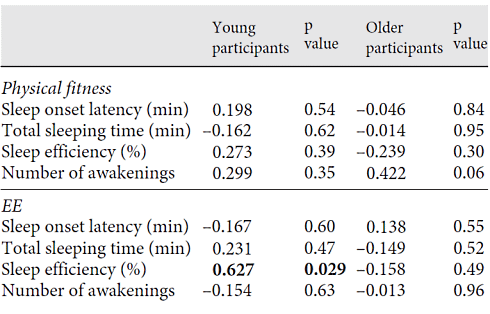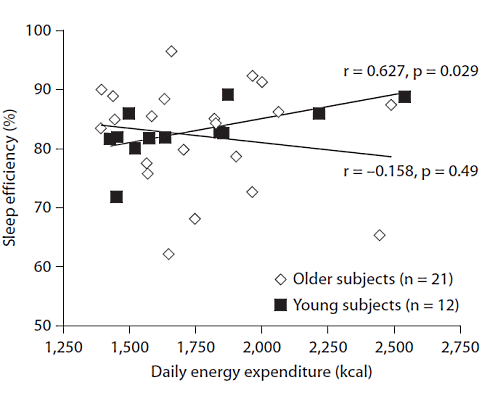BACKGROUND:
Physical activity is known to influence sleep efficiency. Relatively little is known about the relationship between physical activity and sleep efficiency in young and older humans and the impact of exercise training on sleep efficiency in healthy older individuals.
OBJECTIVES:
To determine the relationship between physical fitness and daily energy expenditure with sleep efficiency in young and older subjects, and assess the effect of 12-month exercise training on sleep efficiency in healthy older participants.
METHODS:
The relationship between physical fitness (maximal cycling test) and daily energy expenditure (accelerometry) with sleep efficiency (accelerometry) was examined cross-sectionally in 12 healthy young adults (27 ± 5 years) and 21 healthy older participants (69 ± 3 years). Subsequently, the effect of 12-month exercise training (n = 11) or control period (n = 10) on sleep efficiency in older participants was examined using a randomized controlled trial.
RESULTS:
Daily energy expenditure and sleep efficiency did not differ between young and older subjects. A significant correlation was found between energy expenditure and sleep efficiency (r = 0.627, p = 0.029) in young adults, but not in older participants (r = -0.158, p = 0.49). Physical fitness did not correlate with sleep efficiency in either group. Exercise training significantly improved physical fitness (15.0%, p < 0.001), but failed to alter sleep characteristics such as sleep efficiency, sleep onset latency and awakenings.
CONCLUSIONS:
We found that young adults with higher daily energy expenditure have greater sleep efficiency, whilst this relationship is diminished with advanced age. In contrast, we found no correlation between physical fitness and sleep characteristics in healthy young or older participants, which may explain the lack of improvement in sleep characteristics in older participants with 12-month exercise training. Exercise training may be more successful in subjects with existing sleep disturbances to improve sleep characteristics rather than in healthy older subjects.

